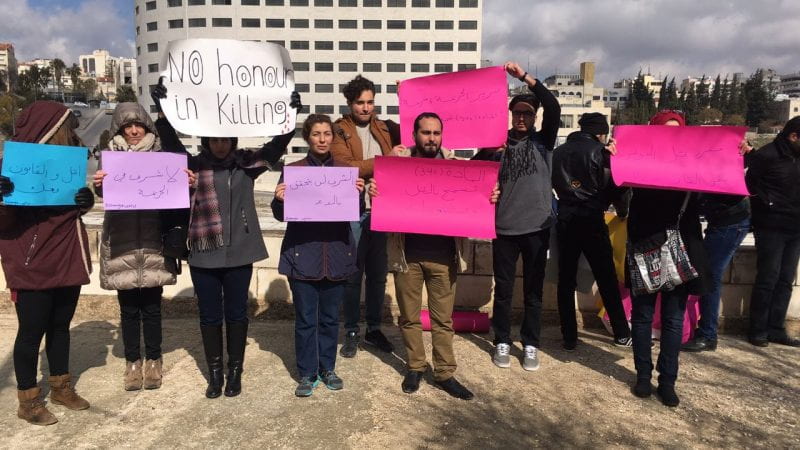
In early August, Israa Ghrayeb, a 21-year-old Palestinian woman, went out with her soon-to-be fiancé on a chaperoned date. As all couples often do, Israa and her fiancé posted a video of their time together on social media. This innocent, loving video would soon incriminate Israa; after seeing the video, three male members of her family were angered, claiming that she had dishonored the family by appearing in public with a man who was not yet her husband. A few days later, these relatives physically attacked Israa, and due to her injuries resulting from this attack, she was hospitalized. Shortly after her hospitalization, a video filmed outside of Israa’s hospital room circulated online, in which Israa’s screams and intermittent thuds can be audibly heard; she was being beaten again. Israa died a day later. However, it is unfair to merely state that she died; Israa was murdered, the victim of an honor killing.
What are Honor Killings?
Honor killings and crimes are committed against a family member who is deemed to have acted socially or culturally unacceptably, and thus is seen to be bringing dishonor to the family. These are almost always carried out by male relatives, and the victim is almost always a woman; 93 percent of honor killing victims are women. According to the United Nations, 5,000 women and girls are victims of honor killings every year. Thus, while males are sometimes victims of honor killings as well, the following discourse pertaining to honor killings will focus solely on female victims.
What’s to Blame?
It is important to begin by noting that honor killings are strictly rooted in culture. Because honor killings are largely carried out in the Middle East/North Africa regions and South Asia, which are Muslim majority areas, Islam is often blamed for encouraging this practice. However, Islam cannot be identified as the culprit in these situations, as it strictly opposes such treatment of women. Further, women being murdered by male relatives or partners is not exclusive to Muslim majority countries; in France, 120 women were killed by their partners in 2018. Considering this is a phenomenon that is not restricted to one culture or region, the culprit is something that is shared across most societies of the world: misogyny, or prejudice against women. Most societies are still largely patriarchal, and thus have problems with women’s rights. While this is the case, many men within these societies are aware of the injustices women face and advocate for change, so it would be unfair to label all men as misogynistic. At the same time, though, many other men do ascribe to misogynistic ideologies, and often times, they act upon them. Honor killings are a blatant example of this; when males believe that their honor is tied to the behavior of the women in their lives, it is clear that misogyny is to blame. Further, to kill a girl in “honor” is to suggest that the girl is not her own person, but rather an object that is owned, emphasizing the misogyny underlying honor killings.
Holding Perpetrators Accountable
After Israa’s murder, both men and women in the West Bank held protests, calling on the Palestinian Authority to take action against the relatives responsible, and through the use of social media, large segments of the Arab population joined in protesting her murder as well. Due to these national and international pressures, the Palestinian Authority pursued the matter closely, and three of Israa’s relatives were detained and will be charged for her murder. However, it is unclear whether or not these men will truly suffer the consequences of their actions; often times, perpetrators are not held accountable for this crime at all. Furthermore, even when they are sentenced for committing honor crimes, they are often released after serving only a few months. Experts argue that this is why honor killings remain prevalent; when the justice system does not adequately address this issue, future perpetrators are not deterred. This is abundantly clear considering that although Palestinian President Mahmoud Abbas made changes to legislation to protect women from honor killings, the number of women who are victims of this crime has continuously risen; in 2012 there were 13 murders, but the number of murders increased to 28 in 2014 and 27 in 2018. Thus, it is evident that legislation passed without proper enforcement is wholly ineffective.

Moving Forward
“The devil is not in the body of women; it is in your mind,” a powerful statement that was displayed on a sign of one of the protestors, is a fundamental notion that must be understood. The ideas that women are inherently inferior, and that women’s bodies are for men to control, are ideas that must be eradicated from our cultures and from predominant male thinking. To do this, certain steps must be taken. First, there needs to be a cultural upheaval involving both men and women to put an end to misogynistic belief systems. This is an effort that begins at a very grassroot level, and starts with changing mentalities of future generations; when boys and girls are raised the same, when boys are taught to respect and value women, when girls are empowered and are made to believe that they are not subservient or inferior to men, we slowly move towards making misogynistic ideologies obsolete. It is important to note this is not an effort that must only be undertaken by communities in the Arab world, but rather is an effort that should be undertaken by communities world-wide. Second, laws need to be put into place to hold men accountable for their abuse of women. It is insufficient to merely pass laws without also enforcing them, as men will believe that they can get away with their crimes without suffering any consequences.
Until the aforementioned changes are made within these societies, it is unlikely that any progress will be made. However, this is not an option; these societies were complicit in the deaths of many women and girls, including Israa. While they cannot bring back the lives that were taken, they must make these changes to ensure no more lives are taken in the name of “honor.”
